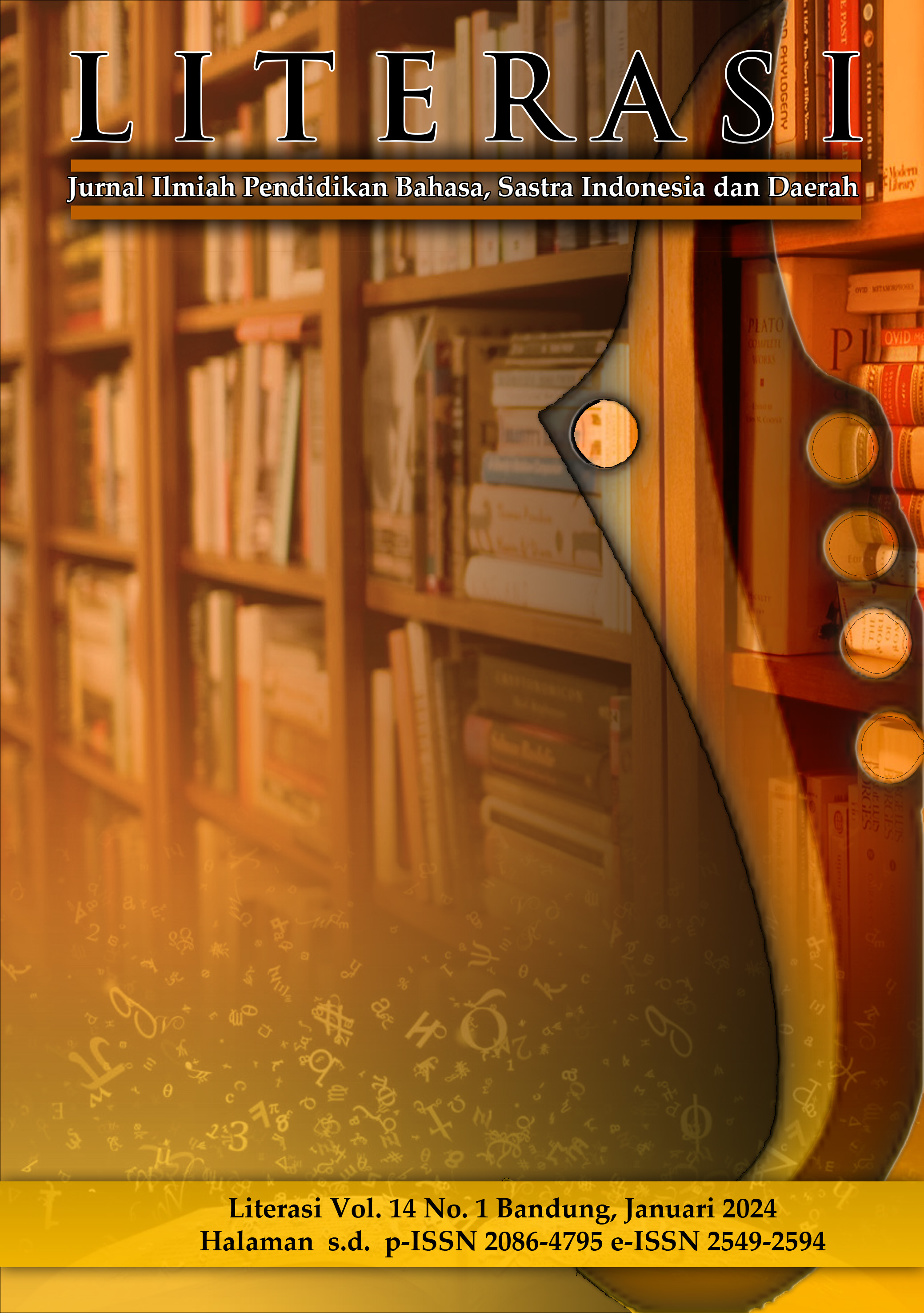KAJIAN SYSTEMATIC LITERATURE REVIEW TERHADAP TERMINOLOGI RELIGIUSITAS DALAM PENELITIAN DI INDONESIA
DOI:
https://doi.org/10.23969/literasi.v14i1.11535Abstract
Research that addresses religiosity in Indonesia amounts to tens of thousands of research titles. This shows that the theme is very interesting and has been studied from various scientific backgrounds. From the results of research using a Systematic Literature Review, it was found that there are many differences in using the concept of religiosity and they are still partial. For this reason, this Systematic Literature Review (SLR) study was carried out to obtain and reconstruct an understanding of religiosity in Indonesia from various research conducted to be more comprehensive and not partial. This SLR uses a database obtained from the search engine Harzing.com. The data obtained was then reduced using the SLR protocol until the amount was sufficient for analysis. As a result, the concept of religiosity in Indonesia does not have much debate, both in terms of terminology and definition. In contrast to abroad, which is actually secular, the debate has been long and there has been no agreement.
Keywords: Studies, Systematic Literature Review, Religiosity, Diversity
Downloads
References
B. Kitchenham, O. Pearl Brereton, D. Budgen, M. Turner, J. Bailey, and S. Linkman. 2009. “Systematic literature reviews in software engineering - A systematic literature review,” Information and Software Technology, vol. 51, no. 1. Elsevier, pp. 7–15.
Casram, C. (2016). Membangun sikap toleransi beragama dalam masyarakat plural. Wawasan: Jurnal Ilmiah Agama Dan Sosial Budaya, 1(2), 187-198
El Hafiz, S. 2020. A literature review on religiosity in psychological research in indonesia: current state and future direction. Psikis: Jurnal Psikologi Islami, 6(1), 81-88.
El Hafiz, S. 2016. Sistem penanganan dini konflik sosial dengan nuansa agama. Jurnal Ilmiah Penelitian Psikologi: Kajian Empiris & Non-Empiris, 2(1), 57-65
Gebauer, J. E., Bleidorn, W., Gosling, S. D., Rentfrow, P. J., Lamb, M. E., & Potter, J. (2014). Cross- cultural variations in Big Five relationships with religiosity: A sociocultural motives perspective. Journal of Personality and Social Psychology, 107(6)
Hariyati, RR. Tutik Sri. 2010. “Mengenal Systematic Review Theory dan Studi Kasus”. Jurnal Keperawatan Indonesia. Vol 13, No 2 (2010) . http://jki.ui.ac.id/index.php/jki/article/view/242/ diakses 15 desember 2021
Holdcroft, B. B. 2006. What is religiosity. Catholic Education: A Journal of inquiry and practice, 10(1).
Hernawan, W. 2017. Prasangka sosial dalam pluralitas keberagamaan di Kecamatan Cigugur Kabupaten Kuningan Jawa Barat. Sosiohumaniora, 19(1), 77-85.
Indirawati, E. 2006. Hubungan antara kematangan beragama dengan kecenderungan strategi coping. Jurnal Psikologi, 3(2), 69-92.
McKay, R., & Whitehouse, H. 2015. Religion and morality. Psychological bulletin, 141(2), 447.
Astiti, Niken. 2018. Pengaruh Religiusitas, Pengetahuan Perbankan, Pengetahuan Produk Perbankan, Pengetahuan Pelayanan Perbankan, Dan Pengetahuan Bagi Hasil Terhadap Preferensi Menggunakan Jasa Perbankan Syaria Asset: Jurnal Ilmiah Bidang Manajemen dan Bisnis Vol. 1, No. 1
Nurmaeni, Rokhmania & Siti Hasanah.2020. Analisis Pengaruh Hedonisme, Religiusitas, Motivasi, dan Promosi Terhadap Keputusan Menabung pada Bang Syariah (Studi Kasus Pada PT Bank BRI Syariah, Tbk. Kantor Cabang Pembantu Majapahit Semarang. Jurnal Tabarru’: Islamic Banking and Finance Volume 3 Nomor 2
Paturohman, I. 2012. Peran Pendidikan Pondok Pesantren Dalam Perbaikan Kondisi Keberagamaan Di Lingkungannya.(Studi Deskriptif Pada Pondok Pesantren Dar Al-Taubah Bandung). Jurnal Tarbawi, 1(1).
Pontoh, Z., & Farid, M. (2015). Hubungan antara religiusitas dan dukungan sosial dengan kebahagiaan pelaku konversi agama. Persona: Jurnal Psikologi Indonesia, 4(1).
Rahmat, A. 2010. Efektifitas Metode Diskusi dan Ceramah dalam Meningkatkan Motivasi Beragama pada Mata Pelajaran PAI Siswa Kelas IX di SMP 03 dan SMP 07 Kota Gorontalo. Jurnal Dakwah, 11(1), 67-87.
Riesebrodt, M. 2000. Fundamentalism and the Resurgence of Religion. Numen, 47(3), 266-287.)
Stavrova, O., Fetchenhauer, D., & Schlösser, T. 2013. Why are religious people happy? The effect of the social norm of religiosity across countries. Social science research, 42(1), 90-105.
Triandini, dkk. 2019. “Metode Systematic Literature Review untuk Identifikasi Platform dan Metode Pengembangan Sistem Informasi di Indonesia”. Indonesian Journal of Information Systems (IJIS) Vol. 1, No. 2, Februari 2019. https://ojs.uajy.ac.id/index.php/IJIS/article/download/1916/1309/ diakses 15 Desember 2021.
Wahono, Romi Satria. 2015. “Systematic Literature Review: Pengantar, Tahapan dan Studi Kasus”.Diunduh dari https://romisatriawahono.net/2016/05/15/systematic-literature- review-pengantar-tahapan-dan-studi-kasus/ di akses 15 Desember 2021
Wati, M., & Sudibyo, B. (2016). Pengaruh pendidikan etika bisnis dan religiusitas terhadap persepsi etis mahasiswa akuntansi. Jurnal Economia, 12(2), 183-201.
Downloads
Published
Issue
Section
License
Copyright (c) 2024 Literasi: Jurnal Ilmiah Pendidikan Bahasa, Sastra Indonesia dan Daerah

This work is licensed under a Creative Commons Attribution 4.0 International License.
Hak cipta artikel yang diterbitkan di jurnal ilmiah dimiliki oleh penerbit, bukan penulis. Hal ini berkaitan dengan koordinasi hak akses untuk cetak ulang atau penggunaan lainnya. Dalam hal ini penerbit mempunyai keluluasaan untuk mempublikasikan artikel sesuai dengan kesepakanan Transfer Agreement (penyerahan hak cipta) antara penerbit dengan penulis.















